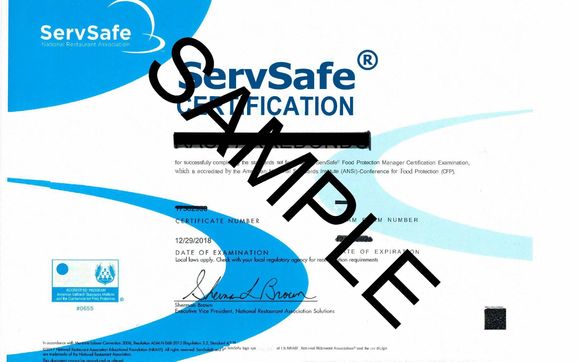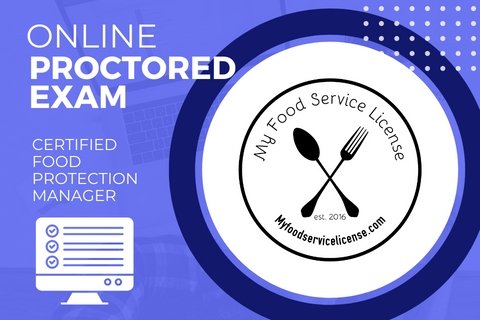Just How ServSafe Manager Certification Improves Food Safety And Security and Compliance
Professional Training for Food Supervisor Certification Made Simple
The relevance of food supervisor qualification can not be underrated, specifically in a period where food safety is critical. Professional training programs have evolved to improve the accreditation process, supplying essential expertise and functional abilities needed for efficient food monitoring.
Value of Food Supervisor Qualification
The relevance of Food Supervisor Qualification can not be overemphasized in today's food service market. This accreditation represents that food managers possess the essential knowledge and skills to make certain food safety and security, maintain health and wellness standards, and support regulatory compliance. In a period where foodborne health problems can have severe effects, the role of a licensed food manager comes to be critical in guarding public wellness.
Food Manager Certification not just gears up individuals with the competence to determine and mitigate food safety dangers however also boosts the reputation of the establishment. Customers are significantly critical; they seek guarantee that their dining experience is hygienic and risk-free. Certification offers as a mark of expertise that can draw in and keep clients.
In addition, many states and local territories mandate that establishments utilize qualified food supervisors to adhere to health and wellness policies. This need underscores the certification's significance in preventing possible legal ramifications and penalties. In addition, a licensed food supervisor can lead staff training, promoting a society of safety and responsibility within the workplace. Investing in Food Manager Qualification is a financial investment in quality, security, and the total success of food service operations.
Summary of Professional Training Programs
Professional training programs for food manager accreditation are created to supply thorough education and learning on food safety techniques, governing conformity, and danger administration. These programs aim to outfit food service specialists with the expertise and abilities essential to make certain secure food handling and prep work in numerous setups, consisting of restaurants, catering services, and institutional food operations.
Usually, professional training programs encompass both theoretical and sensible parts, permitting participants to engage with real-world circumstances. The curriculum often consists of necessary topics such as foodborne diseases, proper food storage techniques, hygiene procedures, and employee training approaches. Furthermore, these programs are regularly upgraded to align with the most up to date sector requirements and regulations, guaranteeing that individuals get relevant and existing details.
Several programs provide adaptable delivery methods, consisting of in-person classes, on the internet courses, or a hybrid technique, dealing with various learning choices and timetables. Upon successful conclusion, individuals typically obtain accreditation, which is usually acknowledged by neighborhood health divisions and regulatory agencies, improving their job leads within the food solution industry. On the whole, professional training programs play an important duty in cultivating a culture of food safety and conformity amongst food managers and team.
Key Topics Covered in Training
Food security is an essential emphasis in food supervisor certification training, including a range of essential topics that guarantee participants are fully equipped to manage food securely. Among the main topics covered is the importance of individual health, that includes proper handwashing techniques and the significance of maintaining tidiness in food preparation areas.
Furthermore, the training addresses foodborne health problems, describing the various microorganisms that can pollute food and the signs connected with these diseases. Participants learn regarding the conditions that promote microbial development, which is crucial for protecting against outbreaks.
Temperature level control is an additional crucial subject, emphasizing the secure food preparation, air conditioning, and storage temperatures necessary to decrease dangers. The training likewise covers cross-contamination prevention approaches, guaranteeing that raw and prepared foods are taken care of appropriately to prevent unsafe communications.
Additionally, food safety and security policies and standards, such as those stated by the FDA and regional wellness departments, are gone over to supply a detailed understanding of compliance needs. Last but not least, reliable parasite control procedures are checked out to secure food establishments from problems that can endanger safety and security. Jointly, these topics lay a solid structure for safe food administration techniques.
Advantages of Expert Training
How can expert training improve food security techniques within a facility? Specialist training furnishes food supervisors with comprehensive understanding of food security guidelines, sector requirements, and ideal practices. This foundational understanding is important for preserving a safe and tidy food preparation setting, inevitably decreasing the threat of foodborne illnesses.
Furthermore, professional training cultivates a positive method to food security by highlighting safety nets and hazard evaluation. Managers trained by industry specialists can effectively determine possible threats and execute strategies to alleviate them. This not only safeguards customers however also improves the establishment's online reputation and credibility.
Furthermore, expert training urges a culture of continual enhancement. Food managers that participate in recurring education are better prepared to adapt to brand-new policies and patterns in the food service sector. This adaptability can lead to enhanced functional efficiency and price financial savings.


Steps to Attain Qualification
Attaining qualification in food administration needs an organized strategy that incorporates a number of crucial steps. People need to pick a recognized training program that provides detailed coursework in food management, safety and security, and hygiene concepts - ServSafe Food Manager Certification. These programs often provide important resources, consisting of research products and method examinations
Next, prospects need to actively involve in the training sessions, whether on the internet or in-person, to enhance their understanding of necessary subjects such as foodborne ailments, personal hygiene, and appropriate food storage space techniques. Engagement in discussions and sensible workouts can further strengthen knowing.

Once appropriately prepared, candidates can set up and take the exam. Effective completion normally requires attaining a particular passing rating, which demonstrates a thorough grip of food safety and security criteria.
Final Thought
In recap, professional training for food manager accreditation plays an important role in guaranteeing food safety and conformity with governing standards. Inevitably, achieving food supervisor accreditation via professional training not just elevates private competencies but also promotes a more secure food atmosphere for all.

Professional training equips food supervisors with thorough expertise of food safety policies, sector requirements, and finest practices.In recap, expert training for food supervisor accreditation plays a critical role in guaranteeing food safety and conformity with regulative requirements (ServSafe Food Manager Certification). Ultimately, attaining food manager certification via professional training not just raises specific competencies yet additionally cultivates a much safer food environment for all